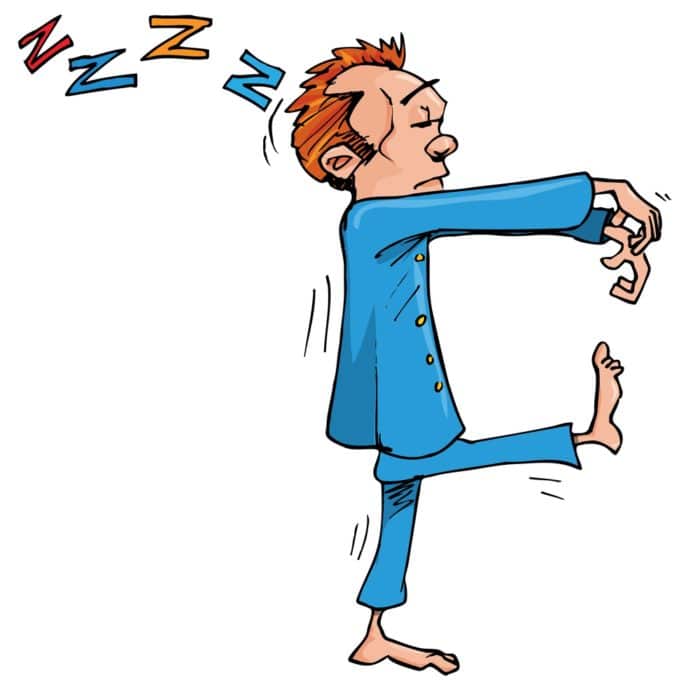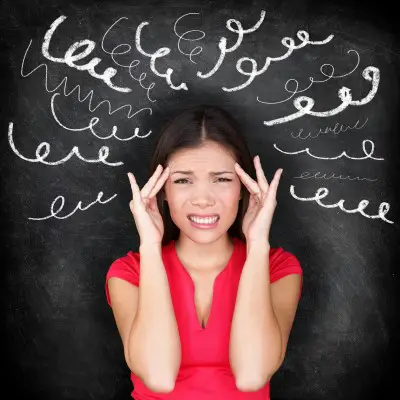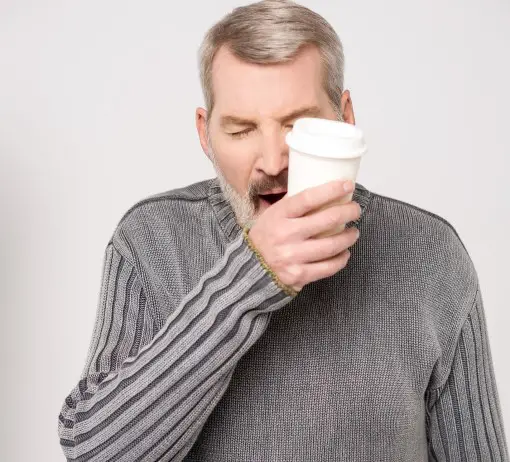
Is sleepwalking really a sign of mental illness? – What we know and what to do if worried
By Jason Wooden, PhD | May 31, 2022
Sleep issues are very common for people with mental health challenges. Evidence for a link between sleepwalking and mental illness includes a large study in which people with major depressive disorder and obsessive-compulsive disorder were 3.5 times more likely to sleepwalk.
A mental health specialist can do an in depth evaluation for mental illness. It’s also important to check for other sleepwalking triggers such as inadequate sleep, being over-stressed, excessive alcohol consumption, medication side effects, and underlying health issues.
CONTENTS:
1) It’s no surprise people are worried about a mental illness link
2) Sleep issues common with mental health challenges
3) Is sleepwalking REALLY a sign of mental illness?
4) Other things sleepwalking could be a sign up
6) Practical remedies for sleepwalking
7) What to do if you’re worried mental illness is involved
Sleepwalking can be pretty disturbing, so it’s no surprise you’re curious whether it’s linked to mental illness
Sleepwalking can be pretty unnerving whether it’s you or someone you know.
It’s scary enough when someone walks to a downstairs couch, but what about trying to use a knife in the kitchen?
Or leaving the house by foot or attempting to drive a car?
Not knowing why it’s happening can add to the stress, especially if you suspect it’s linked to something more serious.
You’re likely not the first to wonder whether sleepwalking is a sign of mental illness since up to 4 percent of adults sleepwalk.
In the US, it’s estimated that there are as many as 8 million adult sleepwalkers!
That’s a lot of people.
So, what has got you suspecting a connection to mental illness?
Maybe you’ve heard stories of people with mental health challenges who sleepwalked…
And perhaps there are other things going you’ve noticed lately that’s got you worried about mental illness.
When people sleepwalk, there’s something going on in the brain for sure but is it really a telltale sign of mental illness?
Regardless, I can understand why you would want a better idea of what could be happening and whether there’s something you should be doing.
Let’s take a look.
Sleep issues are very common for people with mental health challenges
It’s not as crazy as you think that sleepwalking could be a sign of mental illness.
That’s because the mind, brain, behaviors, and body can interact in powerful ways that affect health and wellness. In fact, stress and anxiety are among the most common challenges for sleep.
And it’s very common for people with mental health challenges to have sleep issues:
- Many people who fight depression also struggle with poor sleep
- Sleep disturbances are recognized as a common symptom of anxiety disorders
- Over 90% of military veterans with PTSD also fight insomnia
- Many patients with schizophrenia report sleep abnormalities
While there’s still a lot we don’t understand about sleepwalking, mental and physical stress are known triggers.
So, it’s not too far of a stretch to think that mental health could affect sleep in other ways such as sleepwalking.
Is sleepwalking REALLY a sign of mental illness?
A mental illness is a condition that affects a person’s thinking, feeling, mood, and behavior.
Things are going on in the brain for sure when people sleepwalk but could it really be happening because of mental illness?
The strongest evidence for a link is a huge study done by researchers at Stanford University. They surveyed nearly 16,000 people about their mental health, sleeping habits, medical history, and medication use.
They found that individuals struggling with depression were 3.5 times more likely to sleepwalk than people who are not depressed. People with obsessive-compulsive disorder or alcohol abuse/dependence were also more likely to sleep walk.
A small study involving 14 individuals with schizophrenia-spectrum disorder found that they frequently struggled with insomnia and other sleep issues including sleepwalking.
So, yes, all of this says that sleepwalking could be a sign of mental illness.
As to how the two could be connected, some researchers suspect that changes in the sleep-wake cycle and circadian rhythm may be involved.
However, it’s important to keep in mind that there are other things besides mental illness that could be why you’re sleepwalking.
Whether it’s the main cause or just making things worse, we’re going to take a look at some of these other sleepwalking triggers.
Other things besides mental illness sleepwalking could be a sign of
Sleepwalking has long been considered to be a result of genetics and other triggering factors.
(Genetics is certainly a factor since it tends to run in families.)
Some of the other things besides mental illness that sleepwalking could be a sign of are:

You’re over-stressed
Your body reacts to stress by releasing hormones which make your brain more alert, cause muscles to tense, and affect the body in other ways.
Stress has been found to be a trigger for up to 60% of sleepwalkers. As far as how it’s connected, they’re still figuring out what’s going on.
All the same, sleepwalking could be a sign you have too much stress in your life and you’re way too stressed out at bedtime.

You’re sleep deprived
How has your sleep been lately? Are you waking up feeling rested?
Being over-tired is a known trigger for sleepwalking. A study conducted by Canadian and French researchers involving adult sleepwalkers found that sleep deprivation was a triggering factor for 26% of patients.

You’re drinking too much alcohol
Are you a heavy or late night drinker? You may want to start paying more attention to this.
Alcohol is known to sometimes trigger sleepwalking episodes. In fact, the same Canadian-French study found that alcohol was a trigger for 12% of patients.
Unfortunately, alcohol can affect your sleep in other harmful ways. It can cause your sleep to be more shallow and increase your risk for sleep disorders such as sleep apnea.

There’s something going on with your body
We’ve already looked at how sleepwalking can be linked to things going on in the mind.
Did you know sleepwalking has also been linked to body ailments which include asthma, conditions that affect the brain, fevers in children, heart rhythm problems, heartburn, and sleep apnea?

There’s something going on with a medication you’re taking
Most medications have side effects. Unfortunately, antidepressants, antipsychotics, and beta-blockers have been found to trigger sleepwalking for some patients.
Even some insomnia meds such as sedatives (eszopiclone, zaleplon, and zolpidem) can cause you to sleepwalk.
Practical remedies that can help with sleepwalking
Fortunately, there are plenty of practical things you can try that can help. Some are obvious and simple, others may require an investment of time or money.
Even if you suspect someone’s sleepwalking is linked to mental illness, these remedies are still worth a try as they may help improve the situation:
1) Stress management
It’s obvious why this is at the top of the list. Stress is one of the most common triggering factors.
That makes it important to do whatever you can to keep your stress levels downs.
Start with avoiding any unnecessary stress, setting boundaries around people and commitments, and managing expectations. Be sure to set aside time for fun activities.
Do whatever you can so that you’re relaxed as possible at bedtime whether it’s listening to calming music, light reading, or natural relaxation aids.
Learn more:
Stress management (Helpguide.org)
18 fun and relaxing things to do before bed
Natural relaxation aids
2) Improve your sleep
Since being over tired is a known, it’s important for sleepwalkers to get the best possible sleep they can every night.
Start with sleep hygiene, the everyday things that set the stage for quality sleep.
For better sleep hygiene, you should:
- keep consistent wake up & sleep times
- avoid naps
- exercise during the day
- avoid large meals, alcohol, or stimulants such as caffeine before bedtime
- maintain a regular bedtime routine
- avoid using TVs, laptops, or other electronics before sleep
- keep your bedroom dark, cool, quiet, & relaxing
3) Anticipatory awakening
This involves waking up someone about 15 minutes before they usually sleepwalk. The person then stays awake for a few minutes before falling asleep again.
4) Avoid alcohol
Since alcohol may be a trigger for some people, it should be consumed earlier in the day to avoid it’s effects at night.
5) Sleepwalking prevention devices
Your choices include gates, safety door locks, bedroom door alarms, motion sensors, and floor mat alarms.
6) See a sleep specialist
A sleep doctor can work with you to identify sleepwalking triggers you may be unaware of and other issues for your sleep.
Diagnosis may involve a review of medical and family histories, risk factors, a physical exam, and tests to assess your sleep patterns. Your treatment plan may involve lifestyle changes, behavioral therapy, medicines, medical devices, and specific therapies.
What to do if you’re worried someone is sleepwalking because of mental illness
If you suspect mental illness is involved, it’s still worth trying some of the practical sleepwalking remedies already listed. That will help with managing triggers that could be making things worse.
You can also start learning as much as you can about mental illness including the signs.

Get help from a mental health specialist such as a psychiatrist.
They can do an in depth evaluation which includes:
- a medical history review
- a physical exam and lab test
- a psychological evaluation
Based on their findings, they will work with you on a treatment plan.
Learn more:
Mental illness diagnosis (Mayo Clinic)
Supporting a Friend or Family Member (MentalHealth.gov)
Signs of mental illness
- excessive worrying or fear
- feeling excessively sad or low
- confused thinking or problems concentrating
- extreme mood changes
- irritability or anger
- avoiding friends and social activities
- difficulties understanding or relating to other people
- changes in sleeping habits, feeling tired, or low energy
- changes in eating habits
- changes in sex drive
- difficulty perceiving reality
- inability to perceive changes in one’s own feelings, behavior, or personality
- overuse of substances like alcohol or drugs
- multiple physical ailments without obvious causes
- thinking about suicide
- inability to carry out daily activities
- inability to handle daily problems and stress
- an intense fear of weight gain or concern with appearance
Source: National Alliance of Mental Illness
You may also be interested in:
Sources:
1. “Adult sleepwalking is serious condition that impacts health-related quality of life”, 2013, American Academy of Sleep Medicine
2. “Sleepwalking more prevalent among U.S. adults than previously suspected, researcher says”, 2012, Stanford Medicine
3. “Anxiety and Sleep”, 2022, Sleepfoundation.org
4. Schizophrenia and sleep disorders: links, risks, and management challenges. Nat Sci Sleep. 2017; 9: 227–239.
5. “Sleep Problems in Veterans with PTSD”, U.S. Department of Veterans Affairs website
6. Mental Disorders, MedlinePlus
7. “Sleepwalking More Likely With Several Psychiatric Disorders”, 2012, Psychiatry Online
8. Sleep in Schizophrenia: Exploring Subjective Experiences of Sleep Problems, and Implications for Treatment. Psychiatr Q. 2016 Dec;87(4):633-648.
9. Sleep disorders as core symptoms of depression. Dialogues Clin Neurosci. 2008 Sep; 10(3): 329–336.
10. Is Restless Legs Syndrome Involved in Ambulation Related to Sleepwalking? Sleep. 2016 Apr 1; 39(4): 955–956.
11. Functional Impairment in Adult Sleepwalkers: A Case-Control Study. Sleep. 2013 Mar 1; 36(3): 345–351.
12. “Sleepwalking”, 2021, SleepFoundation.org
13. Medication induced sleepwalking: A systematic review. Sleep Med Rev. 2018 Feb;37:105-113.
14. “FDA adds Boxed Warning for risk of serious injuries caused by sleepwalking with certain prescription insomnia medicines”, 2019, FDA Drug Safety Communication
Connect with us:
About Us
Better Sleep Simplified® was founded as a place for you to get clear and well-researched information.
Our goal is to make sure you know about your options so that you take action sooner rather than later.
Check us out on YouTube:
Watch and Learn
Helpful sleep tips, interesting sleep facts and statistics you want to know about
Affiliate Disclosure
This site is a participant in the Amazon Services LLC Associates Program and other affiliate advertising programs designed to provide a means for sites to earn advertising fees by advertising and linking to them.
Important: BetterSleepSimplified.com is for informational purposes only and is not intended or implied to be a substitute for professional medical advice, diagnosis, or treatment. Always consult a physician for sleep and health concerns. See additional information.
